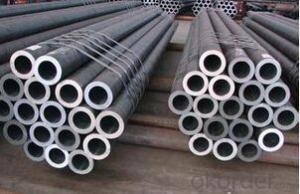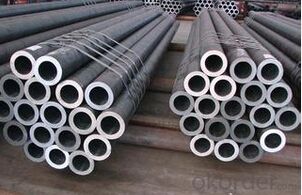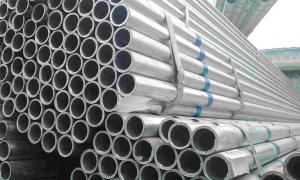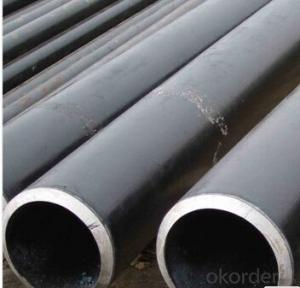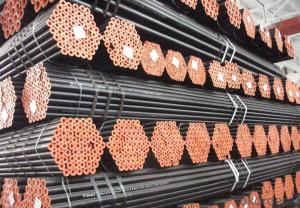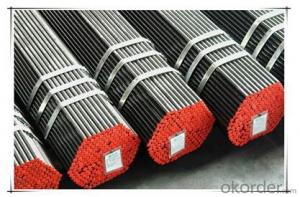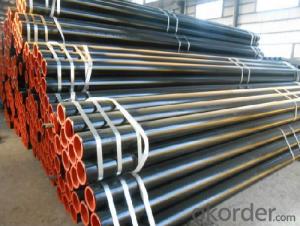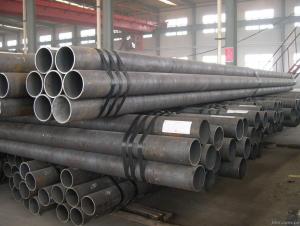Seamless Steel Pipe for low and medium pressure Boiler Tube
- Loading Port:
- Tianjin
- Payment Terms:
- TT or LC
- Min Order Qty:
- 1 m.t.
- Supply Capability:
- 10000 m.t./month
OKorder Service Pledge
OKorder Financial Service
You Might Also Like
Seamless Steel Pipe For Low and Medium Pressure Boiler
1)Size 1/2-24"
2) Material:ASTM A106 GRB/ A53 GRB/ API 5L GRB
Hot Seamless Steel Pipe For Low and Medium Pressure Boiler
Product Name | Seamless Carbon Steel Pipe |
Outside Diameter(mm) | 13.7mm-610mm |
Wall thickness(mm) | 2mm-60mm |
Certification | ISO:9000, API 5L, API 5CT |
Standard | 1.ASTM A106/A53 GR.A; ASTM A106/A53 GR.B; ASTM A53/A106 GR.C 2.APL 5L GR.B, API 5CT J55, K55, N80 3.DIN, JIS, BS, EN |
Grade | A, B, C, ST33, ST37, ST35.8, ST45-8, ST45-4, ST52 |
Face finished | 1.Manual polished 2.mechanical polished 3.black paint on the face 4.anti-rust oil and caps on both ends 5.galvanized |
Export | Europe, South America, the Middle East, Africa, Asia and other countries and regions, well received by consumers! |
Seamless theoretical weight | seamless calculation formula: (OD - Wall Thickness) × thickness × 0.02466 = Seamless weight per meter |
Process Method | 1.Cold Drawn 2.Cold rolled 3.Hot rolled 4. Hot expanded |
Application | Tube with hollow cross-section, a large number of channels for transporting fluids, such as the transportation of oil, natural gas, gas, water and some solid materials, pipes, etc.. |
Package | 1.Inner Packing:Caps at both ends, steel strong trips on every bundle 2.Outer Packing:Standard export package or as per clients' requirements |
- Q: How are steel pipes insulated for thermal applications?
- Steel pipes are commonly insulated for thermal applications using various materials such as fiberglass, mineral wool, or foam insulation. These insulating materials are typically wrapped around the steel pipes to create a protective barrier that reduces heat transfer. Additionally, a vapor barrier may be installed to prevent moisture condensation. This insulation helps to maintain the desired temperature of the fluid or gas being transported through the pipes and prevents energy loss.
- Q: How many fasteners are there in a ton of steel tubes?
- Steel tube (Steel pipe) production technology development began in the bicycle manufacturing industry, the rise of the early nineteenth Century during the oil development, the two world war ships, boilers, aircraft manufacturing, manufacturing of power boiler after the Second World War, the development of chemical industry of petroleum and natural gas drilling and transportation, will effectively promote the the yield and quality of varieties, the development of steel tube industry.
- Q: Are steel pipes suitable for semiconductor manufacturing plants?
- Yes, steel pipes are appropriate for use in semiconductor manufacturing plants. Steel pipes are renowned for their durability, strength, and resistance to corrosion, making them an exceptional option for a variety of industrial applications, including semiconductor manufacturing. Within semiconductor manufacturing plants, a range of chemicals and gases are employed throughout the production process. Steel pipes possess a high degree of resistance to corrosion and can endure the harsh chemicals and gases typically encountered in semiconductor manufacturing environments, thereby ensuring the integrity and longevity of the piping system. Moreover, steel pipes are capable of withstanding high-pressure conditions, which are frequently required in semiconductor manufacturing plants. They exhibit excellent mechanical properties and can endure heavy loads and stress, rendering them dependable for the transportation of fluids and gases under high pressure. Another benefit of steel pipes is their adaptability in terms of size and shape. Semiconductor manufacturing plants often necessitate a complex and intricate piping system to accommodate diverse processes and equipment. Steel pipes can be easily customized and fabricated to meet specific requirements, enabling efficient and seamless integration into the infrastructure of the plant. In summary, steel pipes possess the necessary qualities and characteristics for use in semiconductor manufacturing plants. Their durability, resistance to corrosion, high-pressure capabilities, and flexibility make them a suitable choice for the transportation of chemicals and gases in this industry.
- Q: How are steel pipes protected against chemical corrosion?
- Steel pipes are protected against chemical corrosion through various methods such as coating them with corrosion-resistant materials like epoxy or polyethylene. Additionally, cathodic protection techniques like applying sacrificial anodes or using impressed current systems can also be employed to prevent chemical corrosion on steel pipes.
- Q: Are steel pipes suitable for structural applications?
- Yes, steel pipes are suitable for structural applications. Steel pipes are known for their strength, durability, and versatility, making them ideal for various structural applications. They can be used in buildings, bridges, stadiums, and other structures to provide support and stability. Steel pipes have high tensile strength, which allows them to withstand heavy loads and resist deformation under pressure. Additionally, their resistance to corrosion makes them a reliable choice for structural applications, even in harsh environments. The use of steel pipes in structural applications is further enhanced by their cost-effectiveness and easy installation. Overall, steel pipes are a popular choice in the construction industry due to their strength, durability, versatility, and cost-effectiveness.
- Q: Can steel pipes be used for transportation of hazardous materials?
- Yes, steel pipes can be used for the transportation of hazardous materials. Steel pipes are commonly used for transporting various types of hazardous materials such as chemicals, gases, and liquids. They are known for their strength, durability, and resistance to corrosion, making them suitable for safely transporting these materials over long distances. Additionally, steel pipes can be designed to meet specific safety standards and regulations to ensure the secure transportation of hazardous substances.
- Q: What is the role of steel pipe manufacturers in sustainable development?
- The role of steel pipe manufacturers in sustainable development is to promote environmental responsibility and resource efficiency throughout the production process. They play a crucial role in reducing carbon emissions by adopting cleaner technologies, optimizing energy consumption, and implementing waste management strategies. Additionally, steel pipe manufacturers can contribute to sustainable development by prioritizing the use of recycled materials, supporting recycling initiatives, and ensuring their products have a long lifespan to minimize waste generation. By embracing sustainable practices, steel pipe manufacturers can help create a more sustainable future for the construction and infrastructure industries.
- Q: How are steel pipes used in the manufacturing of boilers?
- Steel pipes are used in the manufacturing of boilers as they provide high strength, durability, and resistance to extreme temperatures and pressure. These pipes are used for transporting hot gases and liquids within the boiler system, ensuring efficient heat transfer and preventing any leaks or failures.
- Q: How are steel pipes used in the renewable energy industry?
- Steel pipes are widely used in the renewable energy industry for various purposes. They are commonly used in the construction of wind turbine towers, where they provide structural support and stability. Steel pipes are also used in the installation of solar panel systems, serving as a reliable conduit for transporting fluids, such as water or heat transfer fluids, within the system. Additionally, steel pipes are utilized in the transportation of renewable energy resources, such as natural gas or hydrogen, as they offer durability and strength to withstand high-pressure conditions.
- Q: What is the difference between steel pipe and aluminum pipe?
- The main difference between steel pipe and aluminum pipe lies in their composition and physical properties. Steel pipes are primarily made of iron and carbon, with other elements added to enhance their strength and corrosion resistance. On the other hand, aluminum pipes are made entirely of aluminum, which is a lightweight and highly corrosion-resistant metal. One significant distinction between steel and aluminum pipes is their weight. Steel is a denser material compared to aluminum, meaning that steel pipes are generally heavier and sturdier. This characteristic makes steel pipes suitable for applications requiring higher structural strength and load-bearing capabilities. Aluminum pipes, on the other hand, offer distinct advantages due to their lightweight nature. They are around one-third the weight of steel pipes, making them easier to handle, transport, and install. This lightweight property also makes aluminum pipes more suitable for applications where weight reduction is crucial, such as in aerospace and automotive industries. Another crucial aspect to consider is corrosion resistance. Steel pipes are prone to rusting and corrosion, especially when exposed to moisture or corrosive environments. To combat this, steel pipes are often coated with protective layers or galvanized to enhance their resistance to corrosion. Aluminum pipes, on the other hand, have excellent natural corrosion resistance due to the formation of a thin layer of aluminum oxide on their surface. This oxide layer acts as a protective barrier, preventing further corrosion and degradation. Cost is another factor to consider when comparing steel and aluminum pipes. Steel pipes are generally more cost-effective compared to aluminum pipes, primarily due to the lower cost of raw materials and manufacturing processes involved. However, it is essential to consider the specific requirements and durability needed for the intended application, as the long-term maintenance costs and lifespan of steel and aluminum pipes may vary. In summary, the difference between steel and aluminum pipes can be summarized based on their weight, strength, corrosion resistance, and cost. Steel pipes are heavier, stronger, and more prone to rusting and corrosion but are generally more cost-effective. Aluminum pipes are lightweight, corrosion-resistant, and costlier but offer advantages in weight reduction and specific applications where corrosion resistance is crucial. Ultimately, the choice between steel and aluminum pipes depends on the specific needs of the project and the desired properties for optimal performance.
Send your message to us
Seamless Steel Pipe for low and medium pressure Boiler Tube
- Loading Port:
- Tianjin
- Payment Terms:
- TT or LC
- Min Order Qty:
- 1 m.t.
- Supply Capability:
- 10000 m.t./month
OKorder Service Pledge
OKorder Financial Service
Similar products
Hot products
Hot Searches
Related keywords
